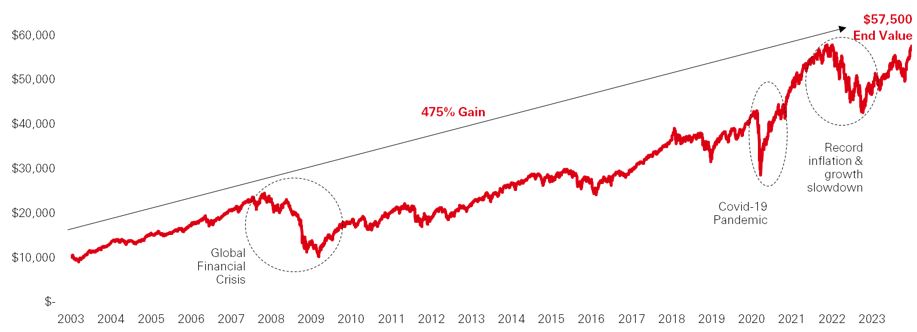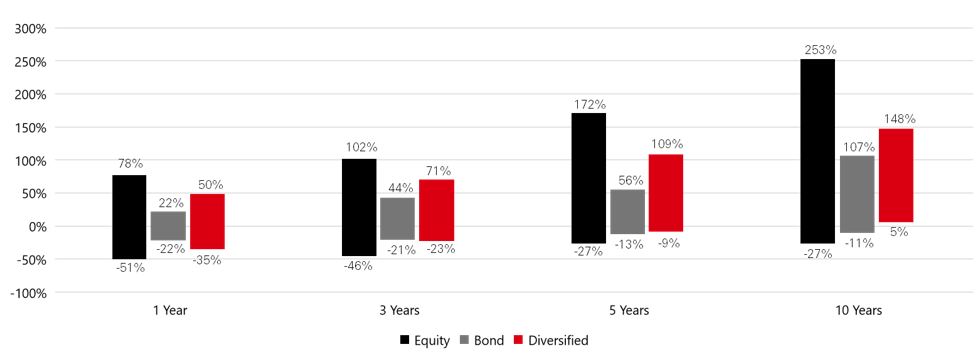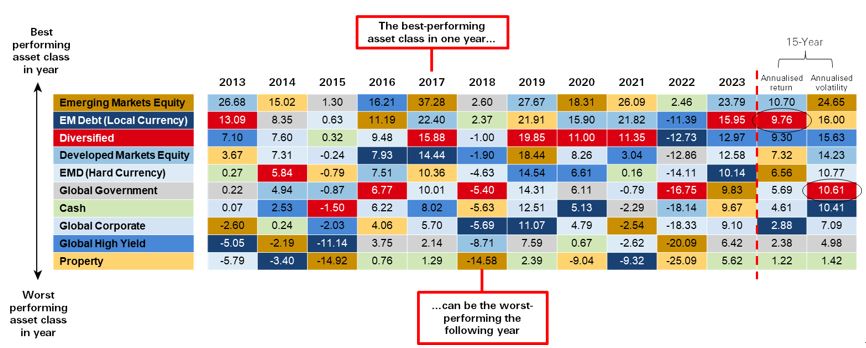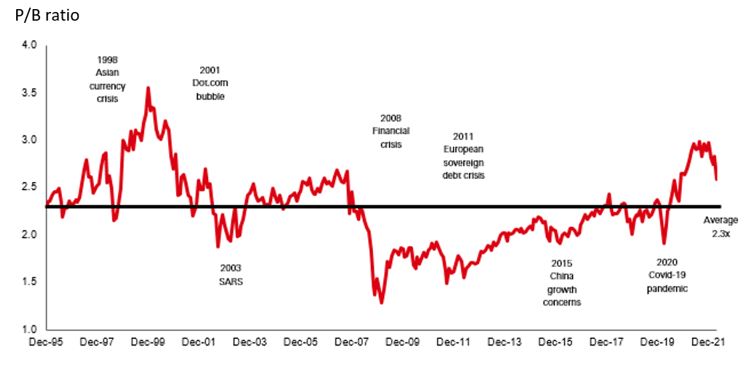
30 Nov 2021
Short-term volatility is part and parcel of the investment journey
Markets can fluctuate depending on the news flow or expectations on valuations and corporate earnings. It is important to remember that volatility is to be expected from time to time in financial markets.
History does not necessarily repeat itself, but it does rhyme. Short-term volatility can occur at any time, but they do not necessarily derail the long-term growth in stock markets. Historically, significant recoveries occur following major setbacks including economic downturns and geopolitical events (Chart 1).
While headline-grabbing news can affect short-term market sentiment and lead to reductions in asset valuations, share prices should ultimately be driven by fundamentals over the long run. Therefore, investors should avoid panic selling during volatile periods, to avoid missing out on any potential market recovery.

Past performance is no guarantee of future returns.
Source: Bloomberg, HSBC Asset Management as at 31 December 2023. MSCI ACWI Net Return index.
Long-term investing increases the chance of positive returns
When markets get rocky, it is tempting to exit the market to avoid further losses. However, those who focus on short-term market volatility may end up buying high and selling low. History has shown that financial markets go up in the long run despite short-term fluctuations (Chart 2).
Though markets do not always follow the same recovery paths, periods after corrections are often critical times to be exposed to the markets. Staying invested for longer periods tends to offer higher return potential.

Past performance is no guarantee of future returns.
Currency: USD. Source: Bloomberg, HSBC Asset Management, as at 31 December 2023. Indices used: Equities – MSCI AC World Total Return Index. Bonds – Bloomberg Global-Aggregate Total Return Index Value Unhedged USD.
Diversification can help achieve a smoother ride
Diversification basically means ‘don’t put all your eggs in one basket’. Different asset classes often perform differently under various market conditions (Chart 3).
By combining assets with different characteristics, the risks and performance of different investments are combined, thus lowering overall portfolio risk. That means, a lower return in one type of asset may be compensated by a gain in another.

Past performance is no guarantee of future returns.
Source: Morningstar, HSBC Asset Management, data to December 2023. All returns in USD, total return. Indices used: DM Equities: MSCI World Index; EM Equities: MSCI Emerging Market Equity; EMD Local currency: Bloomberg EM Local Currency Government Diversified; EMD Hard currency: ICE Bank of America Merrill Lynch Emerging Market Bond Index; Global Corporate Bond: Bloomberg Barclays Global Aggregate Corporate Bond Index; Global High Yield Bond: ICE Bank of America Merrill Lynch Global High Yield; Global Government Bond: FTSE World Government Bond Index; Property: FTSE EPPRA/NAREIT Developed Property Index; Cash: ICE LIBOR 3 Month; Diversified: 'Diversified' performance was calculated using representative asset allocation to all of the stated indices. Bond indices are hedged, ex EMD local currency (i.e. global government, global corporate, global high yield, EMD hard currency). Equities are unhedged.
Market downturns may create opportunities
Don’t be passive in the face of market declines. When market sentiment is low, valuations tend to be driven down which provides investment opportunities (Chart 4). In rising markets, people tend to invest as they chase returns, while in declining markets people tend to sell. When investors overreact to market conditions, they may miss out some of the best-performing days.
Though no one can predict market movements, the times when ‘everyone’ is overwhelmingly negative often turns out to be the best times to invest.

Source: Bloomberg, MSCI ACWI, data as of April 29, 2022. Past performance is no guarantee of future returns. Performance can rise or fall.
Note: Price-to-Book Ratio (P/B) is a ratio used to compare a stock's market value to its book value, calculated by dividing the stock's current closing price by the book value per share from the most recent quarter. A lower P/B ratio suggests that a stock may be undervalued.
Despite volatility
Investing regularly means continuous investment regardless of what is happening in the markets.
When investors make fixed regular investments, they buy more units when prices are low and less when prices are high. This will smooth out the investment journey and average out the price at which units are bought (Chart 5). It thus reduces the risk of investing a lump sum at the wrong time, particularly amid market volatility.
The longer the time frame for investment the better, because it allows more time for investments to grow (the compounding effect).

The chart illustrates the comparison between investing US$1,000 monthly and making a one-time investment of US$12,000. After one year, although the total investment is the same, the number of shares purchased and the accumulated value are higher with monthly regular investments (dollar-cost averaging). In this hypothetical example, the average cost per share with dollar-cost averaging is lower than with a lump-sum investment (i.e., $0.90 compared to $1.00).
Please note that dollar-cost averaging is not always superior to lump-sum investing.
Source: HSBC Asset Management. This information is for illustration purposes only and is unrelated to any investment. Figures and rates are purely hypothetical.




This document or video is prepared by The Hongkong and Shanghai Banking Corporation Limited (‘HBAP’), 1 Queen’s Road Central, Hong Kong. HBAP is incorporated in Hong Kong and is part of the HSBC Group. This document or video is distributed and/or made available by HSBC Bank Canada (including one or more of its subsidiaries HSBC Investment Funds (Canada) Inc. (“HIFC”), HSBC Private Investment Counsel (Canada) Inc. (“HPIC”) and HSBC InvestDirect division of HSBC Securities (Canada) Inc. (“HIDC”)), HSBC Bank (China) Company Limited, HSBC Continental Europe, HBAP, HSBC Bank (Singapore) Limited, HSBC Bank Middle East Limited (UAE), HSBC UK Bank Plc, HSBC Bank Malaysia Berhad (198401015221 (127776-V))/HSBC Amanah Malaysia Berhad (20080100642 1 (807705-X)), HSBC Bank (Taiwan) Limited, HSBC Bank plc, Jersey Branch, HSBC Bank plc, Guernsey Branch, HSBC Bank plc in the Isle of Man, HSBC Continental Europe, Greece, The Hongkong and Shanghai Banking Corporation Limited, India (HSBC India), HSBC Bank (Vietnam) Limited, PT Bank HSBC Indonesia (HBID), HSBC Bank (Uruguay) S.A. (HSBC Uruguay is authorised and oversought by Banco Central del Uruguay), HBAP Sri Lanka Branch, The Hongkong and Shanghai Banking Corporation Limited – Philippine Branch, and HSBC FinTech Services (Shanghai) Company Limited (collectively, the “Distributors”) to their respective clients. This document or video is for general circulation and information purposes only.
The contents of this document or video may not be reproduced or further distributed to any person or entity, whether in whole or in part, for any purpose. This document or video must not be distributed in any jurisdiction where its distribution is unlawful. All non-authorised reproduction or use of this document or video will be the responsibility of the user and may lead to legal proceedings. The material contained in this document or video is for general information purposes only and does not constitute investment research or advice or a recommendation to buy or sell investments. Some of the statements contained in this document or video may be considered forward looking statements which provide current expectations or forecasts of future events. Such forward looking statements are not guarantees of future performance or events and involve risks and uncertainties. Actual results may differ materially from those described in such forward-looking statements as a result of various factors. HBAP and the Distributors do not undertake any obligation to update the forward-looking statements contained herein, or to update the reasons why actual results could differ from those projected in the forward-looking statements. This document or video has no contractual value and is not by any means intended as a solicitation, nor a recommendation for the purchase or sale of any financial instrument in any jurisdiction in which such an offer is not lawful. The views and opinions expressed are based on the HSBC Global Investment Committee at the time of preparation, and are subject to change at any time. These views may not necessarily indicate HSBC Asset Management‘s current portfolios’ composition. Individual portfolios managed by HSBC Asset Management primarily reflect individual clients’ objectives, risk preferences, time horizon, and market liquidity.
The value of investments and the income from them can go down as well as up and investors may not get back the amount originally invested. Past performance contained in this document or video is not a reliable indicator of future performance whilst any forecasts, projections and simulations contained herein should not be relied upon as an indication of future results. Where overseas investments are held the rate of currency exchange may cause the value of such investments to go down as well as up. Investments in emerging markets are by their nature higher risk and potentially more volatile than those inherent in some established markets. Economies in emerging markets generally are heavily dependent upon international trade and, accordingly, have been and may continue to be affected adversely by trade barriers, exchange controls, managed adjustments in relative currency values and other protectionist measures imposed or negotiated by the countries with which they trade. These economies also have been and may continue to be affected adversely by economic conditions in the countries in which they trade. Investments are subject to market risks, read all investment related documents carefully.
This document or video provides a high level overview of the recent economic environment and has been prepared for information purposes only. The views presented are those of HBAP and are based on HBAP’s global views and may not necessarily align with the Distributors’ local views. It has not been prepared in accordance with legal requirements designed to promote the independence of investment research and is not subject to any prohibition on dealing ahead of its dissemination. It is not intended to provide and should not be relied on for accounting, legal or tax advice. Before you make any investment decision, you may wish to consult an independent financial adviser. In the event that you choose not to seek advice from a financial adviser, you should carefully consider whether the investment product is suitable for you. You are advised to obtain appropriate professional advice where necessary.
The accuracy and/or completeness of any third party information obtained from sources which we believe to be reliable might have not been independently verified, hence Customer must seek from several sources prior to making investment decision.
Important Information about HSBC Global Asset Management (Canada) Limited (“AMCA”)
HSBC Asset Management is a group of companies, including AMCA, that are engaged in investment advisory and fund management activities, which are ultimately owned by HSBC Holdings plc. AMCA is a wholly owned subsidiary of, but separate entity from, HSBC Bank Canada.
Important Information about HSBC Investment Funds (Canada) Inc. (“HIFC”)
HIFC is the principal distributor of the HSBC Mutual Funds and offers the HSBC Mutual Funds and/or the HSBC Pooled Funds through the HSBC World Selection® Portfolio service. HIFC is a subsidiary of AMCA, and indirect subsidiary of HSBC Bank Canada, and provides its products and services in all provinces of Canada except Prince Edward Island. Mutual fund investments are subject to risks. Please read the Fund Facts before investing.
®World Selection is a registered trademark of HSBC Group Management Services Limited.
Important Information about HSBC Private Investment Counsel (Canada) Inc. (“HPIC”)
HPIC is a direct subsidiary of HSBC Bank Canada and provides services in all provinces of Canada except Prince Edward Island. The Private Investment Counsel service is a discretionary portfolio management service offered by HPIC. Under this discretionary service, assets of participating clients will be invested by HPIC or its delegated portfolio manager, AMCA, in securities, including but not limited to, stocks, bonds, mutual funds, pooled funds and derivatives. The value of an investment in or purchased as part of the Private Investment Counsel service may change frequently and past performance may not be repeated.
Important Information about HSBC InvestDirect (“HIDC”)
HIDC is a division of HSBC Securities (Canada) Inc., a direct subsidiary of, but separate entity from, HSBC Bank Canada. HIDC is an order execution only service. HIDC will not conduct suitability assessments of client account holdings or of the orders submitted by clients or from anyone authorized to trade on the client’s behalf. Clients have the sole responsibility for their investment decisions and securities transactions.
Important Information about the Hongkong and Shanghai Banking Corporation Limited, India (“HSBC India”)
HSBC India is a branch of The Hongkong and Shanghai Banking Corporation Limited. HSBC India is a distributor of mutual funds and referrer of investment products from third party entities registered and regulated in India. HSBC India does not distribute investment products to those persons who are either the citizens or residents of United States of America (USA), Canada, Australia or New Zealand or any other jurisdiction where such distribution would be contrary to law or regulation.
The following statement is only applicable to HSBC Bank (Taiwan) Limited with regard to how the publication is distributed to its customers: HSBC Bank (Taiwan) Limited (“the Bank”) shall fulfill the fiduciary duty act as a reasonable person once in exercising offering/conducting ordinary care in offering trust services/ business. However, the Bank disclaims any guarantee on the management or operation performance of the trust business.
The following statement is only applicable to PT Bank HSBC Indonesia (“HBID”): PT Bank HSBC Indonesia (“HBID”) is licensed and supervised by Indonesia Financial Services Authority (“OJK”). Customer must understand that historical performance does not guarantee future performance. Investment product that are offered in HBID is third party products, HBID is a selling agent for third party product such as Mutual Fund and Bonds. HBID and HSBC Group (HSBC Holdings Plc and its subsidiaries and associates company or any of its branches) does not guarantee the underlying investment, principal or return on customer investment. Investment in Mutual Funds and Bonds is not covered by the deposit insurance program of the Indonesian Deposit Insurance Corporation (LPS).
THE CONTENTS OF THIS DOCUMENT OR VIDEO HAVE NOT BEEN REVIEWED BY ANY REGULATORY AUTHORITY IN HONG KONG OR ANY OTHER JURISDICTION.
YOU ARE ADVISED TO EXERCISE CAUTION IN RELATION TO THE INVESTMENT AND THIS DOCUMENT OR VIDEO. IF YOU ARE IN DOUBT ABOUT ANY OF THE CONTENTS OF THIS DOCUMENT OR VIDEO, YOU SHOULD OBTAIN INDEPENDENT PROFESSIONAL ADVICE.
© Copyright 2023. The Hongkong and Shanghai Banking Corporation Limited, ALL RIGHTS RESERVED.
No part of this document or video may be reproduced, stored in a retrieval system, or transmitted, on any form or by any means, electronic, mechanical, photocopying, recording or otherwise, without the prior written permission of The Hongkong and Shanghai Banking Corporation Limited.
Important information on sustainable investing
“Sustainable investments” include investment approaches or instruments which consider environmental, social, governance and/or other sustainability factors (collectively, “sustainability”) to varying degrees. Certain instruments we include within this category may be in the process of changing to deliver sustainability outcomes.
There is no guarantee that sustainable investments will produce returns similar to those which don’t consider these factors. Sustainable investments may diverge from traditional market benchmarks.
In addition, there is no standard definition of, or measurement criteria for sustainable investments, or the impact of sustainable investments (“sustainability impact”). Sustainable investment and sustainability impact measurement criteria are (a) highly subjective and (b) may vary significantly across and within sectors.
HSBC may rely on measurement criteria devised and/or reported by third party providers or issuers. HSBC does not always conduct its own specific due diligence in relation to measurement criteria. There is no guarantee: (a) that the nature of the sustainability impact or measurement criteria of an investment will be aligned with any particular investor’s sustainability goals; or (b) that the stated level or target level of sustainability impact will be achieved.
Sustainable investing is an evolving area and new regulations may come into effect which may affect how an investment is categorised or labelled. An investment which is considered to fulfil sustainable criteria today may not meet those criteria at some point in the future.